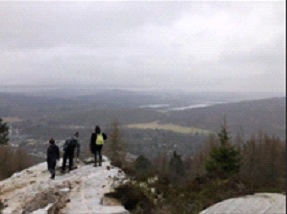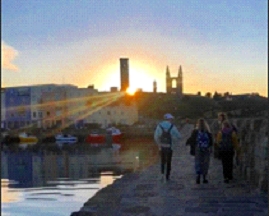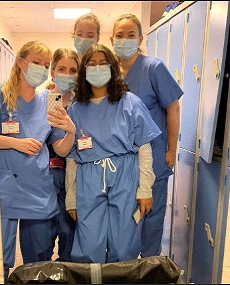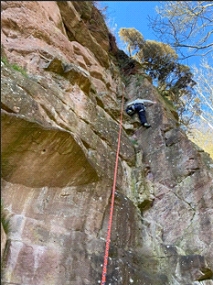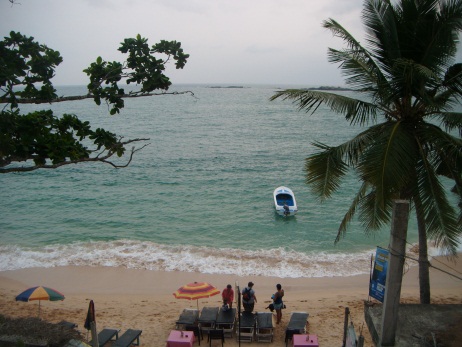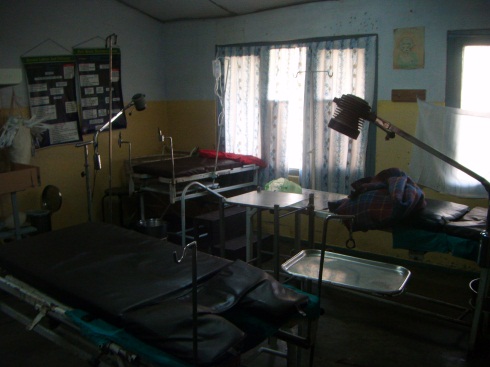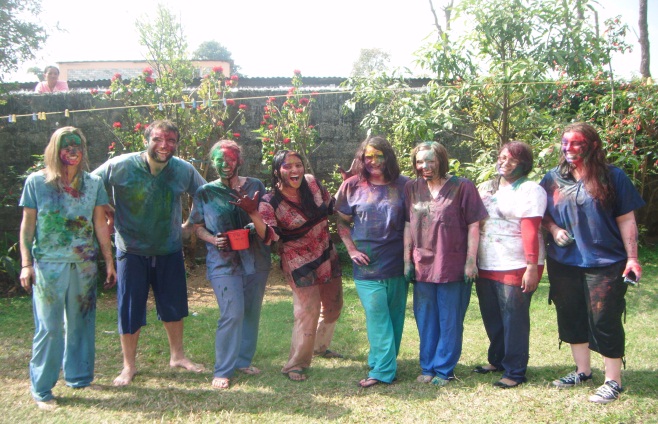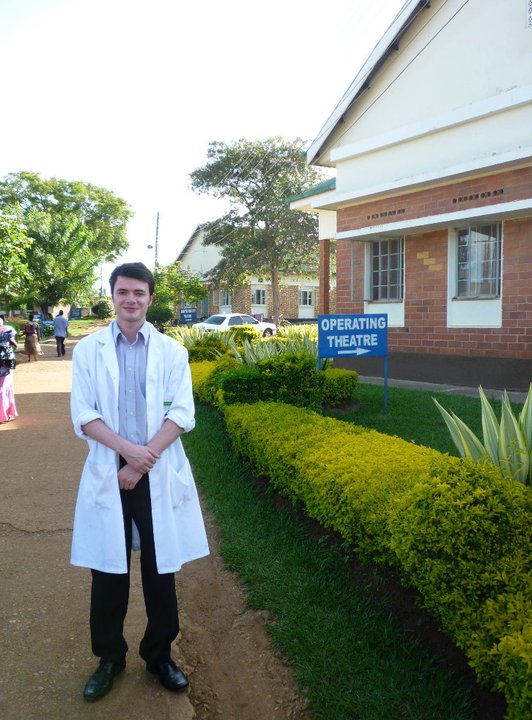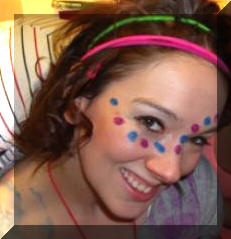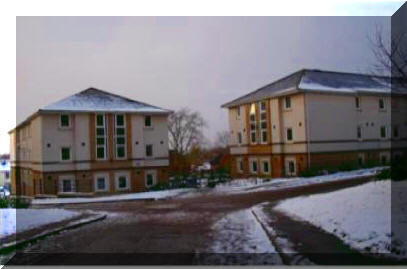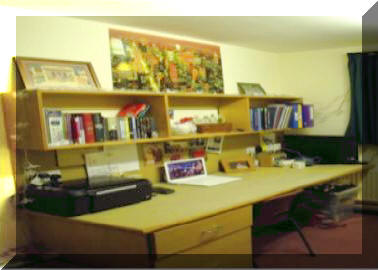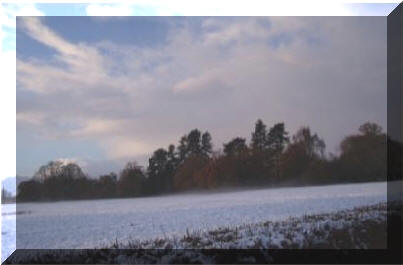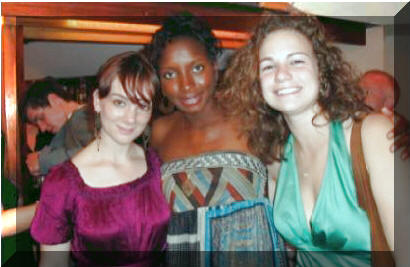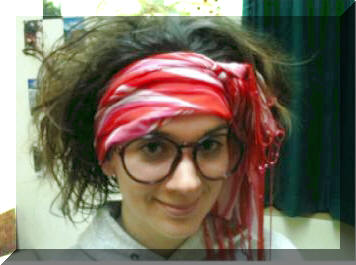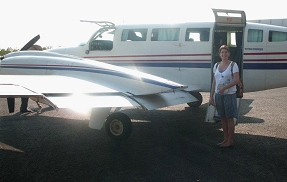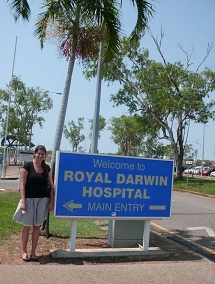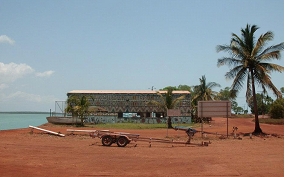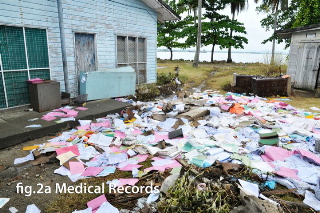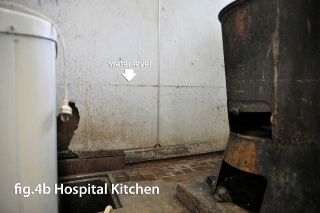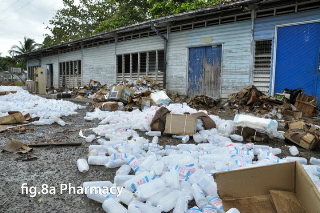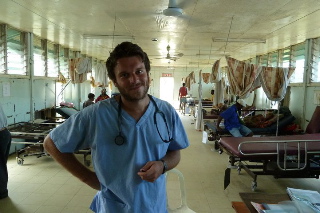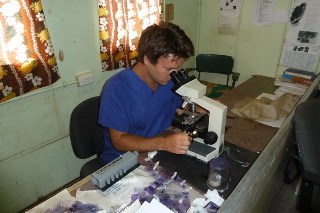Bursary Reports 2011
|
A year in Natal Thomas Mendes da Costa |
|
Again I would like to express my
appreciation for the bursary from the Kidderminster Medical
Society which, despite the title of this article which will
become apparent shortly, was used towards funding my recently
completed Masters degree in Trauma Surgery from the University
of Wales. Many reading this will I’m sure know my father Dr
Baron Mendes da Costa, who worked as a local GP in Kidderminster
for 30 years until his retirement early last year which I can
assure you has done little to slow him down! Although following
the same degree path, we have deviated widely in specialty, and
I am currently in my third year as a registrar of Orthopedics
and Trauma in the Severn Deanery. Whilst in the twilight of my
career I am sure a quiet elective list of a bunion or two and
the occasional arthroplasty will be quite fulfilling, my
interest during junior surgical training has always been
traumatology. It is this interest which has led me on to the
Masters degree course run at Morriston Hospital, Swansea.
The trauma unit at Morriston Hospital is
currently one of the few in the UK to offer all specialties
required to support poly-traumatised patients on site, most
centres requiring referral links to specialist centres as a
patients needs dictate. This includes burns, plastics, vascular
and neurosurgical teams to support the surgical, orthopaedic and
intensive care teams who make up the front line trauma response
team. This provided an ideal setting and a wealth of experience
form which a years taught course programme was formulated,
concentrating initially on the physiology of the traumatic
process, kinetics of trauma, and the indication and effect of
early resuscitative or emergency intervention, through to
methods and timing of emergency and definitive surgery, and
culminating in recovery and rehabilitation. Visiting military
and civilian lecturers covered the broad range of challenges
posed by the spectrum of both trauma and the individuals
affected, with real time scenarios played out with (sometimes
all-to-realistic) medical actors to ensure the practical and
theoretical elements to trauma care were all addressed.
Following the taught course, a
dissertation was undertaken, for which I studied open fractures
of the tibia. If you will excuse the dramatism, this is
essentially a broken shin bone sticking out the skin and the
decision of exactly what to do with it. Treatment of the complex
fracture patterns, with associated commonly severe soft tissue
injuries, can be a difficult decision for patient and surgeon
alike, as treatment varies from fixation and closure to
amputation, with multiple options in between. These include a
variety of fixation methods (plates, intramedullary nails and
external fixators) and requirements for treatment of surrounding
soft tissues (debridement, need for plastic surgical flap
coverage etc). To assist the surgeon with this dilemma there are
a number of scoring systems that are used on presentation to
help guide treatment and prognosis, so as to select the best
method for salvage and rehabilitation, whilst not exposing the
patient to the risks of lengthy salvage operations which may
increase the risk of morbidity or mortality without yielding a
superior result. My study focussed on comparing one new and one
mainstream scoring system with the well established system
already internationally used but widely regarded as being of
little practical use. These scoring systems would be used on all
patients presenting with open tibial fractures, and the eventual
outcome compared to the recommendation of each system.
Having obtained deanery and college
approval, I commenced work as a medical officer in February
2010. The Orthopaedic department was extremely busy, and, along
with a thankfully never-ending supply of nurse translators, and
surprisingly patient locals who would think nothing of a four
plus hour wait to see the doctor, the long queues of patients in
chairs and on stretchers were tended to three times a week.
Three all-day trauma lists ran side-by-side twice weekly to fix
those who could wait, and a non-stop trauma list was available
for the operative emergencies. Surgical instruments and implants
were in good supply, but the pressures of blood shortages and
periodic civil strike action were new challenges to face.
Seniority was achieved quickly working in this environment, with
surgical skills acquired being taught in turn to those more
junior to enhance the strength of the available workforce.
Thomas Mendes da Costa
|
|
James Parsons In April earlier this year I embarked upon my medical elective as part of the MB ChB programme at the University of Birmingham. I decided to travel to Kitovu Hospital, a small missionary led hospital in Masaka, Uganda. The focal point of my project was to look at the diagnosis and management of HIV and Malaria. I chose to go to Uganda as these two diseases are the two biggest contributors in terms of mortality of the population.1 Along with this I wanted to get a comprehensive experience of what healthcare systems are really like in third world countries, where resources are often scarce and simple diagnostic tests are often unavailable. I therefore spent each week of my four week placement rotating between the four main wards in the hospital: Medicine, Surgery, Obstetrics & Gynaecology and Paediatrics. During my first week I shadowed and assisted the hospital physician on the medical ward. This entailed daily morning ward rounds followed by ward jobs, procedures and medical outpatient clinics. HIV and malaria are common conditions. At any one point at least half of the ward (15 beds in total) were being treated for Malaria. These patients would often have massive hepatosplenomegaly and so I was able to practice and improve my examination skills to great effect.
This week also allowed me to see first hand the difficulties faced by doctors in the third world. During the week I was on the medical ward the radiographer was on holiday and so there was no imaging modality available at the hospital. Instead doctors would either have to send patients to the next large hospital to have an x-ray, which would often take days, or rely purely on clinical signs. This helped me to truly appreciate how lucky we are to have access to such comprehensive healthcare here in the UK. Following this week I spent a week on the Paediatrics ward, which was coupled with both the Hospital Nutrition Unit and the Hospital Outreach Team. During this week I helped manage the 30 young children on the ward. I have yet to do Paediatrics as a specialty in the UK and so this gave me a brilliant opportunity to learn about the different problems children experience and also to learn how to go about examining a child. As stated above I also got to spend some time on the Nutrition Unit where I was able to see numerous children with Marasmus and Kwashiorkor. I was shocked at how poor some of the families were. The parents often didn’t even have enough money to feed themselves, let alone their childre My final two weeks were spent on the Obstetrics & Gynaecology ward and the Surgical ward. My week on the Obstetrics & Gynaecology ward allowed me to develop my confidence in dealing with and managing a pregnancy. I also got to watch and assist surgeons carrying out Caesarian sections, which was an extraordinary experience, as again I have yet to do my Obstetrics placement in the UK. The week I spent on the surgical ward was also just as rewarding. I was allowed to practice my suturing skills a number of times and I also watched several emergency operations being carried out. Overall my elective was a challenging but incredibly rewarding experience and I would like to thank the Kidderminster Medical Society for the bursary they provided me with to help fund it.
James Parsons
|
|
Robyn Hill 1st Year Bursary Report Curriculum UEA is problem-based learning (PBL), systems organised, 5-yr MBBS. On Friday mornings, in groups of 10, we meet with out PBL tutor and go over the week's scenario. From this we produce learning outcomes for the next week. These are divided between the group members (each having 2) and the work is due in on coming Tuesday. The timetable was the same each week. Monday's lectures and anatomy, Tuesday lectures and seminars, Wednesday is a half day with anatomy and inter-professional learning in the morning, Thursday is GP placement and Friday is PBL with presentations of our learning outcomes and brainstorming for the next week. The last lecture of the day on Friday is "wrap up". A consultant or GP will come in and go over the key topics from the week. Hospital placement This year I have had 2 hospital placements both at the Norfolk and Norwich University Hospital. In the New Year I was in oncology for 4 weeks and in the summer I had another 4 weeks in rheumatology and orthopaedics. Oncology was not at all what I expected it to be and the consultants gave me a different view of cancer. They highlighted that for patients with chronic illnesses such as respiratory problems, often there is limited amount doctors can do. With cancer patients some can be successfully treated and for many people years can be added on their lives. The rheumatology and orthopaedic placement was more hands on- including a rememberable paediatric session with 10 children aging from 0-15yrs. In groups of three we had ten minutes to get a history, examine and then diagnose the child before moving on to the next child. It finished up with the group having to present the case to the consultant surgeon to show what we had found out. Theatre I was lucky enough to go into theatre when I was on my oncology rotation and saw open chest surgery. The surgeon even let me scrub up and assist him (he let me cut the thread which was very close to the heart!). I also had surgery slots for orthopaedics and saw hip replacements, shoulder arthroscopy, a compartment syndrome patient and time with the anaesthetist prior to surgery. The anaesthetist was particularly nice and once they had given the anaesthetic they let
me do the breathing for the patient by squeezing the air bag and during the long operation taught me basic life support for my forthcoming OSCE (I achieved full marks for BSL which I give much credit to the anaethetist!). GP Placement I spent each Thursday in general practice at Stowmarket Surgery in Suffolk. It is a very large practice including it's own gym and alternative medicines shop. We had 2 GP tutors Dr. Rebecca Ball and Dr. Cort Williamson - one for the morning and one for the afternoon. In pairs we saw patients twice a day for an hour where we practiced history taking, taking manual BP and practiced examinations. The rest of the time was spent with the tutors, learning new examinations, drugs of the week, prescribing tasks and using the clinical system to get data on patients for our logbooks. Anatomy Dissection places at university are limited due to the small size of the dissecting room however I managed to get a place on it next year. I am looking forward to this but apprehensive as it dramatically increases your workload as we teach the non-dissecting students in addition to the actual dissection time. I lived in university halls, Beech Flat (picture above) and made some lovely friends. The six medical students in the flat got on so well that we have decided to live together next year. 5 of us are graduates and one 18-yr old proper fresher.
I am pleased to report that I successfully past my
exams and will moving onto the second year in September.
The year is banded A-D and tantalizingly I was 1 mark off the top band in my autumn exams and 2 marks off the top in my summer exams. I am happy I passed well but next year my aim is to be in the A band and then in the final three years move towards a distinction. I am already looking ahead to my elective and particularly interested in the opportunity of spending it at Yale University. International students are eligible to do 2,4-week placements alongside the Yale students at local hospitals in America. When I moved to Norwich I joined the university rowing club and trained with the women's squad. I did a little bit of coxing and rowing. Unfortunately, Women's Henley fell on the week of my exams and 8 sessions of training proved hard manage with medicine. Instead I started running and currently considering entering the Edinburgh Marathon with couple of the other students. Now I'm settled into medical school I would like to go back to rowing. The UEA medical students have a reputation for fancy dress and by the end of the first year I had been a surgeon, Frankenstein, a Fantastic Four and Harry Potter's Professor Trelawney........
As soon as term ended I returned home to Bewdley and began working at Upton Surgery, Worcestershire summarising medical notes and doing clinical audits for them. I am currently working 40hrs a week and saving money towards my living costs and the first term fees for next year. I am hoping to take to have a few days off before returning to Norwich, so I can have a break before term starts in September. Finally Once again I would like to thank you for the generous £3000 bursary. It enabled me to focus on my studies rather than constantly worrying about how to pay my fees. I cannot thank you enough for this. Leaving my job, moving away from my long-term boyfriend and family to the other side of the country was hard and the financial pressure being reduced for the first year made this difficult time a lot easier. I have thoroughly enjoyed medicine and feel that I made the right decision. I have made some lovely friends and looking forward to next year - dermatology, haematology, respiratory medicine and cardiology. I think it will be a very busy year!
Robyn Hill
|
|
Harriet Webb Elective in Australia I spent my elective in Australia; one month in a GP practice near Brisbane and one month in The Royal Darwin Hospital in the Northern Territory.
My GP placement helped me to develop my history and examination skills and because of the high incidence of skin cancers in Australia I was able to assist with many excisions and improve my suturing. There were many similarities to general practice in the UK but significant differences in the way the healthcare system is funded, which was very interesting. I also came into contact with conditions I hadn’t seen before; scarlet fever, Giardia from water tanks and Rickettsia from tick bites. One patient brought in a funnel web spider that had bitten her but luckily there was no venom released! Being in Darwin was a very different experience and was very interesting. A WHO report states that there is a 20 year gap in the average life expectancy of an Australian and an Aboriginal person.1 I was with the Renal medicine team and saw the problems associated with the large area the hospital is trying to cover; the Northern Territory is six times the size of the UK with only five hospitals. The hospital runs outreach clinics to improve healthcare access for aboriginal people living in remote communities and I was able to attend one of these on the beautiful Tiwi Islands. Through talking to doctors and patients I was able to learn a little about Aboriginal culture and can appreciate some of the differences from Western society. This elective was fantastic and I learnt about renal medicine, the challenges faced in providing access to healthcare over a large area, and working with patients who have differences in culture and health beliefs. I was very lucky to have this experience and greatly appreciate the bursary from the Kidderminster Medical Society that helped me go on my elective
Harriet Webb
|
|
Daniel Cox From the West to Wewak: A Medical Student's elective in Papua New Guinea
To explore healthcare and its delivery in a lesser economically developed country; drawing comparisons with the NHS with the intention of trying to shape our services for the better on my return. Objectives of the Project i) To become emersed in the medical culture of Papua New Guinea, exploring beliefs, behaviours and attitudes towards health in a population very different from our own. ii) To see how specific groups of people in Papua New Guinea interact with healthcare services: specifically women, the elderly and people living with chonric diseases. iii) To learn more about tropical diseases and H.I.V. from patients and professionals from a experiential point of view iv) To consider how the delivery of healthcare may be tailored to a more economically strained setting and how money (or the lack of it) effects healthcare provision in Papua New Guinea. Explain how you achieved the aims and objectives of your elective. Objective 1: I sought out patients from the groups I was considering and kept anonymous records of their management/presentations etc. I contrasted the patient's treatments to those in the UK, in my reflective journal. Objective 2: Each day I have seen cases of malaria in addition to TB, HIV, leprosy, tropical splenomegaly, worms etc. I have learned their presentations/managements and have made a portfolio of interesting cases. Objective 3: The lack of resources available was evident: e.g. the hospital lacked a water supply most days. Each evening I reflected on how the staff dealt with such dilemmas in my journal.
Were there any flaws in the methods you used to address your aims and objectives? Describe them. If none, explain why you think there were not any? On arrival, I discovered that the hospital had been hit by a tsunami caused by the Japanese earthquake. Hospital services had been reduced to cater only for emergencies. Accordingly I modified the planned methods for my objectives to take this into account. E.g. for Objective 1, I had to examine how patients presenting with acute complications of chronic disease usually managed their disease, rather than attending their routine clinics etc. 'Flaws' in my planned methods were circumstantial rather than due to problems with my preparation and I overcame them by adapting my methods within the scope of broad objectives.
What were the Learning Outcomes from this elective? Were they what you expected? During my elective I feel that I have met each of my planned learning objectives but the stark nature of some of the patient's conditions and circumstances has left a deeper emotional stamp on my memory than the intellectual exercise I wished to achieve. It is one thing, for example, to want to understand how women interact with healthcare services in a developing country but it is very much another to be confronted by a woman in A&E who has suffered domestic abuse at the hand of her machete wielding husband whose only punishment would be a set hospital fine (6 pounds sterling). Reflect on how your Elective complimented your medical undergraduate career (a deeper understanding of life; a better understanding of communicable diseases; etc.) Has it affected your future career intentions?
On reflection I realise that I have been able to develop many of the skills that have been fostered during my undergraduate training whilst studying in PNG; procedural skills, consultation frameworks, advanced communication techniques with non English speakers etc. These experiences will have direct practical value for my foundation training.
However, I now feel that other, less tangible, aspects of my study here will have a greater effect on me as a doctor going forward. I have witnessed the great social and physical impact of chronic disease on people who receive little treatment, been exposed to deaths from diseases I consider easily preventable, and seen the serious social stigma that people can receive due to illness and much more. These experiences have given me a greater understanding of what it is to be a patient, the patient's narrative. These are valuable insights that will remain with me forever and will improve my future practice.
My time in PNG has
given me much exposure to infectious disease medicine and has
perpetuated my desire for a career in this field. Having seen the
importance of infectious disease prevention here, I am now strongly
considering applying to spend some time at the W.H.O. Would you recommend this location to another student? Why?
In PNG I have learnt not only about tropical disease, trauma etc. but also the art of practising medicine where resources are scare and poverty is abundant. All whilst bathed in the tropical sunshine of an island with some of the warmest people I've met. I would absolutely recommend it.
Daniel Cox
|
| Click
HERE to go
back to the Bursary Report Index |
